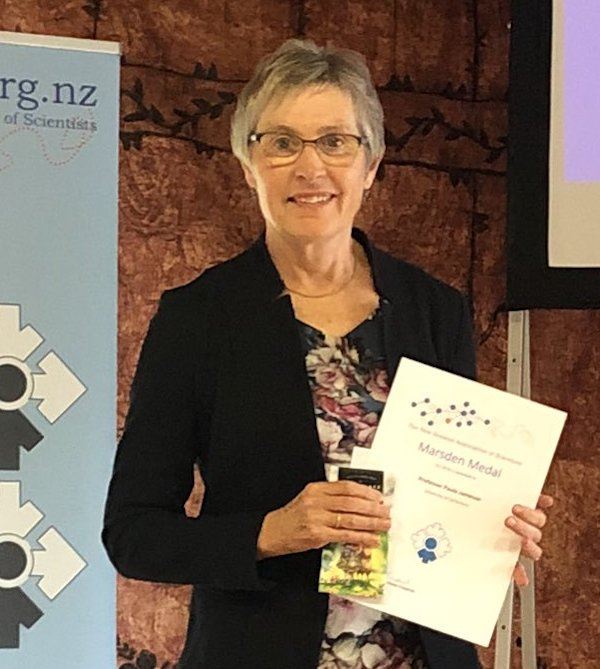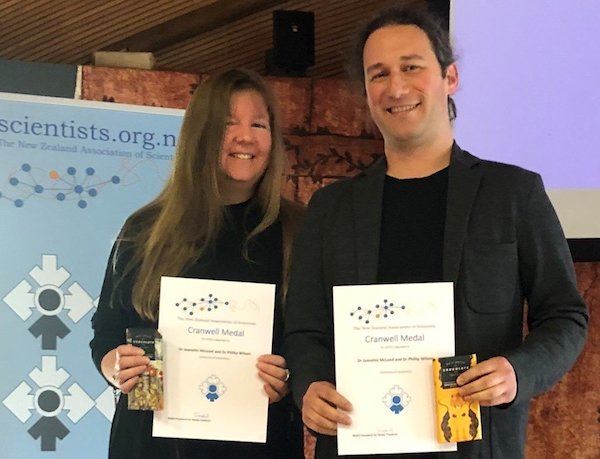Marsden Medal 2019
 Professor Paula Jameson is a leading plant scientist. Her work has been notable in combining internationally-recognised research on the regulation of plant growth with an interest in New Zealand's indigenous flora. Paula’s research demonstrates academic excellence, yet is also beautifully tailored to the needs of end users. Paula served as Chair of the RSNZ Marsden Ecology, Evolution & Behaviour panel, was on the ministerially-appointed Independent Biotechnology Council, and was the Principal Moderator for PBRF 2018: roles requiring a wise and dispassionate voice while superintending a fair process. In 2004, Paula was appointed the inaugural Head of the School of Biological Sciences (SBS) at Canterbury University. Through her direct leadership and mentorship of early career academics, SBS is now one of New Zealand’s highly ranked groupings of biologists. Meanwhile she has maintained a highly productive research program and involvement in the community, especially on issues relating to genetic technologies. Paula’s key contributions include elucidating the myriad roles that the plant hormone group, the cytokinins, play in plant development. She has applied this knowledge through major collaborations with the applied sector in areas of forage and seed production, and fruit development. She has also contributed to our understanding of the regulation of development and flowering of our native species. In addition to her stellar international reputation, her achievements have been lauded by peers from numerous New Zealand institutions, leading to life fellowships from the agricultural, horticultural and plant biology communities. Paula is a highly sought-after mentor, having supervised to completion over 80 postgraduate students from around the globe.
Professor Paula Jameson is a leading plant scientist. Her work has been notable in combining internationally-recognised research on the regulation of plant growth with an interest in New Zealand's indigenous flora. Paula’s research demonstrates academic excellence, yet is also beautifully tailored to the needs of end users. Paula served as Chair of the RSNZ Marsden Ecology, Evolution & Behaviour panel, was on the ministerially-appointed Independent Biotechnology Council, and was the Principal Moderator for PBRF 2018: roles requiring a wise and dispassionate voice while superintending a fair process. In 2004, Paula was appointed the inaugural Head of the School of Biological Sciences (SBS) at Canterbury University. Through her direct leadership and mentorship of early career academics, SBS is now one of New Zealand’s highly ranked groupings of biologists. Meanwhile she has maintained a highly productive research program and involvement in the community, especially on issues relating to genetic technologies. Paula’s key contributions include elucidating the myriad roles that the plant hormone group, the cytokinins, play in plant development. She has applied this knowledge through major collaborations with the applied sector in areas of forage and seed production, and fruit development. She has also contributed to our understanding of the regulation of development and flowering of our native species. In addition to her stellar international reputation, her achievements have been lauded by peers from numerous New Zealand institutions, leading to life fellowships from the agricultural, horticultural and plant biology communities. Paula is a highly sought-after mentor, having supervised to completion over 80 postgraduate students from around the globe.
Hill Tinsley Medal 2019
 Dr Nick Golledge is an internationally recognised expert in modelling ice sheet and individual glacier behaviour over a range of time periods using state of the art, high resolution computer models. His research has been able to provide pioneering insights into past ice-sheet behaviour that are robustly underpinned by field observations. Since joining Victoria University of Wellington’s Antarctic Research Centre in 2009 soon after completing his PhD, he has focused on modelling Antarctic ice sheets and their contribution to sea-level rise. He has a background in geology and glaciology and readily collaborates with modellers and field scientists around the world. His research and impact in the last 10 years has been considerable having published many high-impact scientific articles, including his latest Nature paper which explores the global consequences of 21st century ice-sheet melting. He has been an invited keynote speaker at some of the world’s most influential climate change meetings and workshops, and his results have made media headlines around the world.
Dr Nick Golledge is an internationally recognised expert in modelling ice sheet and individual glacier behaviour over a range of time periods using state of the art, high resolution computer models. His research has been able to provide pioneering insights into past ice-sheet behaviour that are robustly underpinned by field observations. Since joining Victoria University of Wellington’s Antarctic Research Centre in 2009 soon after completing his PhD, he has focused on modelling Antarctic ice sheets and their contribution to sea-level rise. He has a background in geology and glaciology and readily collaborates with modellers and field scientists around the world. His research and impact in the last 10 years has been considerable having published many high-impact scientific articles, including his latest Nature paper which explores the global consequences of 21st century ice-sheet melting. He has been an invited keynote speaker at some of the world’s most influential climate change meetings and workshops, and his results have made media headlines around the world.
Cranwell Medal 2019

The winners of the 2019 New Zealand Association of Scientists Cranwell Medal for Science Communication are Dr Jeanette McLeod and Dr Phil Wilson, mathematicians at the University of Canterbury. In mid-2016, they launched Maths Craft New Zealand, a non-profit initiative which brings maths to the masses by celebrating the links between mathematics and craft. Maths Craft shows young and old alike the fun, creativity, and beauty in mathematics through the medium of craft, demonstrate just how much mathematics there is in craft, and enable people to experience what it means to think like a mathematician.
Since its inception, Maths Craft have run numerous festivals and workshops across New Zealand, and have now reached more than 11,000 people, making them the largest maths outreach programme in the country. As Director and Deputy Director of Maths Craft, Jeanette and Phil have organised and run multiple free public festivals around the country; secured over $275,000 in grants, sponsorship, and in-kind support; written dozens of freely-available instructional handouts; trained and mentored many volunteers and team members; trained teachers; given public talks; and collaborated with other researchers to investigate the efficacy of their approach.
By making mathematics accessible through craft, Jeanette and Phil’s ultimate aim is to rid New Zealand of maths phobia. They are very worthy winners of the 2019 Cranwell Medal.
Shorland Medal 2019

SHIVERS (Southern Hemisphere Influenza and Vaccine Effectiveness Research and Surveillance) is a multi-disciplinary collaboration between ESR, the Universities of Auckland and Otago, and the Auckland and Counties Manukau District Health Boards. The co-PIs are Drs Nikki Turner (General Practice, UoA), Michael Baker (Epidemiology, UoO), Cameron Grant (Paediatrics, ADHB) and Adrian Trenholme (Paediatrics, UoA).
SHIVERS is a public health science initiative that is informing policy changes nationally and internationally through generating ground-breaking new knowledge. The project has received NZ$20 million in international research funds, which has led to new surveillance methods and established essential national infrastructure and emergency response capability. In 2016, SHIVERS was recognised by the Ministry of Business, Innovation and Employment as an exemplar for its beneficial economic, health, social and cultural outcomes. The SHIVERS team has received national and international recognition and in 2018 earned the Science New Zealand National Team Award, and the US Centre for Disease Control's Charles Shepard Science Award for excellence in science and Larry Anderson Award for Outstanding Public Health Science.
© 2024 NZAS | Disclaimer Sitemap |